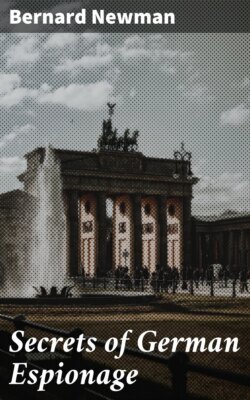Читать книгу Secrets of German Espionage - Bernard Newman - Страница 15
На сайте Литреса книга снята с продажи.
XI
ОглавлениеThe days have long passed—if they ever existed—when the spy was a dark, handsome man with a black moustache, accompanied by a glamorous blonde. The successful spy of to-day is the most ordinary person—that is why he is successful. If he should be held up by the police, his papers are in perfect order: he always has a perfectly legitimate reason for being where he is. He gets his best results in the least sensational fashion.
I remember once visiting a certain Balkan country on a bicycle. From casual gossip in village inns, I heard that this country was erecting a series of concrete block-houses round one of its frontiers. They were kept well away from railways or main roads, but, said the village gossip, had already been built to cover the frontier by-ways. The block-houses sounded interesting, and naturally I wanted to have a look at them.
Had I been a spy of fiction, my course would have been determined for me. I would have approached the first sentry cautiously, and strangled him with my bare hands—why strangling is always essential in spy stories I have never been able to discover. Then I would have got into a ditch and crawled for a mile or two—the idea being that the ditch would have given me cover. Actually, as I am somewhat large, it would have to be a considerable ditch. Approaching the block-house, I would find the way barred by another sentry. Disposing of him—also with bare hands—I would begin to make notes in some complicated code of the dimensions and sites of the little forts. These alone would be insufficient—a photograph is more valuable than any sketch. I would be prepared for this; before setting out upon the expedition, I would have consulted my old friend Dr. Thorndyke, whose invaluable assistant would have produced for me a camera disguised as a water-melon. This I would place on the edge of the ditch: it would be a remarkable camera, able to take pictures through a twelve-inch wall.
I do not claim that it would be impossible to get information by such methods—it might be possible, though I never yet met any spy who did. Such thrills and fantastic devices were, however, quite unnecessary. I simply rode my bicycle along a country lane towards the frontier. Sure enough, a hundred yards from the road, instead of the wooden hut which usually houses frontier guards, was a veritable miniature fortress. The men on duty appeared very pleased to see me—no one ever passed along this road, and they were bored. It was a hot afternoon, and when I remarked on this I was immediately invited into the block-house for refreshment. As I passed through the door, naturally I glanced sideways—and was able to estimate the thickness of the concrete wall. From this it was but an elementary calculation to discover the size of the guns which would be necessary to knock the fort down.
Sitting at the table, chatting with my hosts, I noticed that the windows were rather small—and that a metal shield was parked at the top and the bottom of each window. By casual glance I observed that if the top sheet were lowered and the bottom one raised, they would not quite meet in the middle—there would be a horizontal slot two or three inches wide. This immediately suggested the armament of the fort. A glance at the floor confirmed my estimate. Here were three small grooves lined with brass—obviously intended for the metal feet of a machine-gun tripod.
The armament was easily calculated, therefore—all I had to do was to count the number of windows. Yet my fantastic spy story would be correct in one instance—a photograph is highly advisable. After staying an hour or so, two of the frontier guards escorted me into the middle of no-man’s-land—one of them shouldering his rifle, while the other pushed my bicycle. At the moment of parting I suggested that I would like to take a photograph of them as a souvenir of our happy meeting. They agreed at once, stood to attention—one of them still holding my bicycle. I carefully paced off the necessary ten feet, adjusted the focus of my camera, and pressed button “A.”
When I got back to England, however, my photograph was a great disappointment. It appeared that I had made a hopeless mess of the focusing—instead of fixing the meter at ten feet, I must have swung it round to infinity. Consequently the picture of the two soldiers was hopelessly blurred. By a curious coincidence, however, by their side was a small white speck, which on examination under the magnifying glass proved to be the block-house, a hundred yards away. Through my unfortunate mistake with the focusing, the block-house was in perfect focus, and when enlarged twenty or thirty times gave an adequate picture of the miniature fort on this Balkan frontier!
